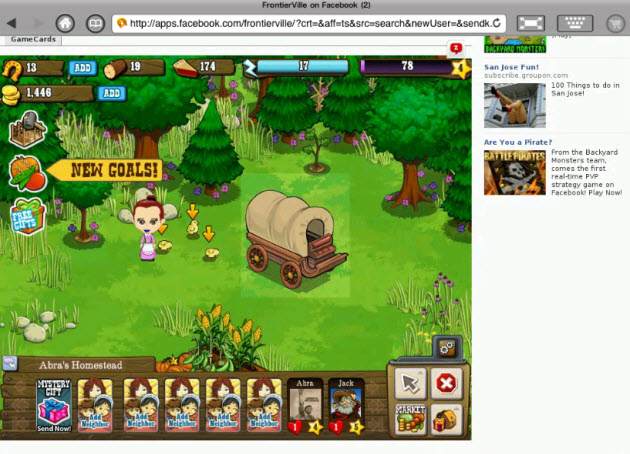 Social games maker Zynga, the developer behind smash hits like FarmVille and CityVille, filed for an initial public offering on Friday. It is one of the largest initial public offerings expected this year, alongside group-buying site Groupon.
Social games maker Zynga, the developer behind smash hits like FarmVille and CityVille, filed for an initial public offering on Friday. It is one of the largest initial public offerings expected this year, alongside group-buying site Groupon.
But the way the companies are run, and how efficiently they generate money, couldn’t be any more different.
Compared to Groupon, which has enormous administrative costs and is hemorrhaging a lot of money, Zynga is a ruthlessly-run, well-oiled machine. The social gaming company has kept its administrative costs to a minimum and, while it hasn’t kept up with Groupon in terms of revenue, has been the most profitable company to file for an initial public offering this year.
Zynga has since become a Facebook distribution powerhouse like no other game company. That makes it a lot easier for Zynga to generate revenue, since a percentage of users usually pays for items in otherwise free games.
The company has delivered hit after hit to Facebook. Zynga’s latest social game, Empires & Allies, is another hit for the company. It attracted more players than FarmVille, its first breakout hit, in just 25 days. Empires & Allies is gaining new users at a rate of a million a day and 8 million a week now, according to AppData.
Here are a few significant differences between two of the most hotly anticipated IPOs this year:
Revenue: Groupon brings in much more revenue than Zynga. The group-buying site brought in $713.4 million in 2010. The company brought in $644.7 million in the first quarter this year, up from $44.2 million in the first quarter last year. By comparison, Zynga brought in $598 million in revenue last year and $235 million in revenue in the first quarter this year, up from $101 million in revenue in the same quarter a year earlier.
Profit: The biggest difference between the two companies is that Zynga is profitable, while Groupon has lost a lot of money. Zynga made a $90 million profit in 2010. It made a profit of $11.8 million in the first quarter this year, up from $6.4 million in the first quarter of 2010. Groupon has consistently lost money each quarter except for one — the first quarter of 2010, when it brought in an $8 million profit. Groupon lost $456.3 million in 2010 and $6.9 million in 2009. The company lost $146.5 million in the first quarter this year.
Marketing Costs: Compared to Groupon, Zynga spends very little on marketing. Groupon spent $263.2 million on marketing in 2010 and $208.2 million in the first quarter this year. Zynga spent $40.2 million on marketing in the first quarter this year and $114 million in 2010.
Selling, General and Administrative Costs: Groupon has enormous administrative costs that make up roughly a third of its operating expenses. Groupon spent $233.9 million on administrative costs in 2010. The company has spent $178.9 million on administrative costs in the first quarter this year, compared to $4 million in the first quarter last year.
By comparison, Zynga’s administrative costs only make up a fraction of the company’s total costs. The company spent $32.3 million on administrative costs in 2010, or 7 percent of its total costs. Zynga spent $27.1 million on administrative costs in the first quarter this year, or 13 percent of its total costs that quarter, compared to $16.5 million in the first quarter last year.
Groupon currently has 661 employees in North America and 2,895 international employees. As of the end of May, Zynga had 2,268 employees.
 We’ll be exploring the most disruptive game technologies and business models at our third annual GamesBeat 2011conference, on July 12-13 at the Palace Hotel in San Francisco. It will focus on the disruptive trends in the mobile games market. GamesBeat is co-located with our MobileBeat 2011conference this year. To register, click on this link. Sponsors can message us at sponsors@venturebeat.com. Our sponsors include Qualcomm, Flurry, Greystripe, Nexage, Tapjoy, Fun Mobility, TriNet, Zong, Spil Games and WildTangent.
We’ll be exploring the most disruptive game technologies and business models at our third annual GamesBeat 2011conference, on July 12-13 at the Palace Hotel in San Francisco. It will focus on the disruptive trends in the mobile games market. GamesBeat is co-located with our MobileBeat 2011conference this year. To register, click on this link. Sponsors can message us at sponsors@venturebeat.com. Our sponsors include Qualcomm, Flurry, Greystripe, Nexage, Tapjoy, Fun Mobility, TriNet, Zong, Spil Games and WildTangent.
VentureBeat's mission is to be a digital town square for technical decision-makers to gain knowledge about transformative enterprise technology and transact. Learn More

